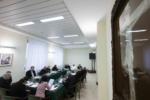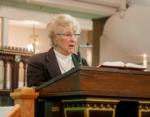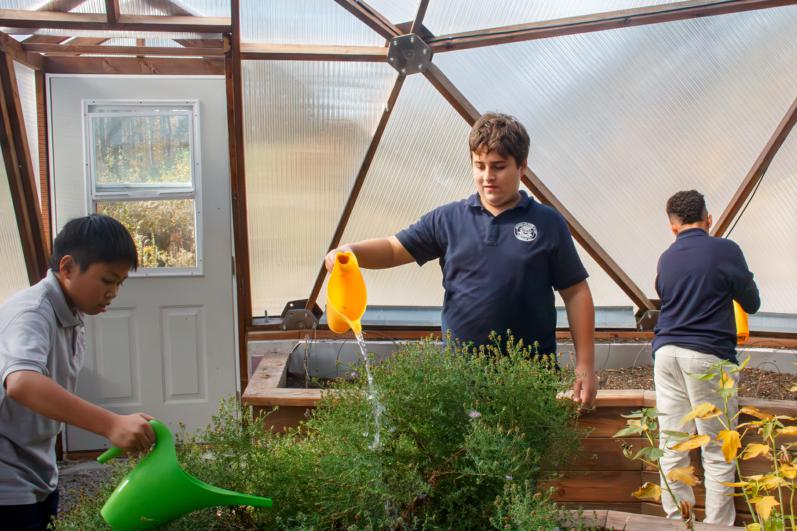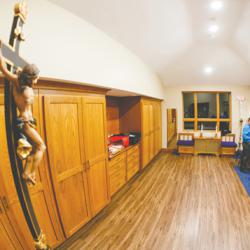Forming the Future: Notre Dame Academy, Tyngsborough, geodome feeds hungry, highlights beauty of creation
TYNGSBOROUGH -- Martina Boakye-Yiadom, a junior at Notre Dame Academy in Tyngsborough, enjoys "being down and dirty with the plants."
Boakye-Yiadom works in the school's "geodome," a climate-controlled indoor garden that grows over 20 plant species. She and other students are in charge of watering, planting, and harvesting the crops, and distributing the fresh produce to food pantries in the Merrimack Valley.
Boakye-Yiadom admitted that, before working in the geodome, her relationship with food was "see-it-and-eat-it." Now, she has an "up-close-and-personal feeling with plants."
"It's very interesting to see the process of how they grow things," Boakye-Yiadom said. "We have the whole setup, and that's pretty cool because most people don't know where their food comes from."
On Oct. 27, Notre Dame Academy President Dr. Vittoria Pacifico, Principal Dr. James Flynn, Director of Campus Ministry Jamie Deignan, and Communications Director Kelley Rice paid the geodome a visit. The futuristic white dome, located in a clearing in the woods next to the school, gleamed in the sun as the four officials approached. It was built in 2019 at an approximate cost of $100,000.
"It's more sophisticated than a greenhouse," Rice explained.
It is a self-contained, self-sustaining miniature ecosystem that is 42 feet in diameter. The structure is made partly from beeswax, allowing it to expand or contract depending on the temperature outside. Solar panels, and a 4,000-gallon aquarium with 13 goldfish inside, keep the temperature inside stable throughout the year. Inside the aquarium, bamboo grows out of a polystyrene TV package that has been repurposed into a makeshift pot.
"It's a living, learning lab," Pacifico said.
She said that the geodome teaches students to "take care of our earth," referencing Pope Francis's 2015 environmentalist encyclical "Laudato si'." It also allows the students to grow food for those in need, living up to the mission of the school's sponsors, the Sisters of Notre Dame de Namur.
"We know that there's a lot of food insecurity locally around us," Flynn said, "and we have a ton of committed faculty, staff, and students who really want to look at doing community service."
Notre Dame Academy's long-term goal is to feed 5,000 people a year with food grown inside the geodome. Currently, the geodome grows cantaloupes, peppers, potatoes, and tomatoes, among other crops.
"They're really sweet," Deignan said as she enjoyed yellow tomatoes fresh off the vine. "So delicious."
Besides food, the geodome grows marigolds, zinnias, tulips, and sunflowers, which students plant around campus.
Deignan said that the geodome "brings God's goodness into the world," and teaches students to do the same.
Notre Dame students learn to conserve resources by collecting seeds from the crops they grow. Last year's pumpkin seeds grew into this year's pumpkins, and kindergarteners collected seeds from this year's pumpkins in order to grow next year's.
"We want every student to be involved," Pacifico said, "from pre-K all the way to the high school."
The current system of watering the geodome is "inefficient," according to Flynn, so the ninth-grade STEM students are brainstorming better watering systems. Thanks to the geodome, the seventh-grade science class now has a much greater focus on environmental studies. Environmental science students make dirt from the geodome into clay, which the art students make into pottery (it helps that the environmental science teacher and the art teacher are the same person).
"For our staff," Rice said, "it's created this spark of 'This is cool, but what could I do with it?'"
In the spring, the school will sell dinnerware created by the art students to raise money for the Merrimack Valley Food Bank.
"They all have a role in a small way," Deignan said, "and it's a great way for them to see that their community together makes great strides in feeding the hungry."


















